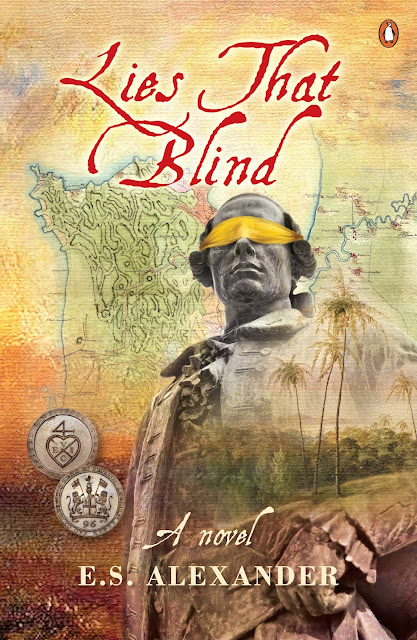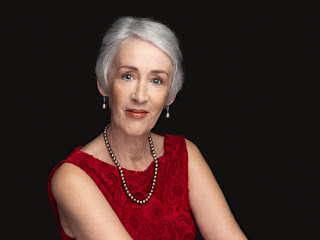Lies That Blind
By E.S. Alexander
What would you risk to avoid obscurity?
Malaya, 1788
Aspiring journalist Jim Lloyd jeopardises his future in ways he never could have imagined. He risks his wealthy father’s wrath to ride the coat-tails of Captain Francis Light, an adventurer governing the East India Company’s new trading settlement on Penang. Once arrived on the island, Jim—as Light’s assistant—hopes that chronicling his employer’s achievements will propel them both to enduring fame. But the naïve young man soon discovers that years of deception and double-dealing have strained relations between Light and Penang’s legal owner, Sultan Abdullah of Queda, almost to the point of war. Tensions mount: Pirate activity escalates, traders complain about Light’s monopolies, and inhabitants threaten to flee, fearing a battle the fledgling settlement cannot hope to win against the Malays. Jim realises that a shared obsession with renown has brought him and Light perilously close to infamy: a fate the younger man, at least, fears more than death. Yet Jim will not leave Penang because of his dedication to Light’s young son, William, and his perplexing attraction to a mercurial Dutchman. He must stay and confront his own misguided ambitions as well as help save the legacy of a man he has come to despise.
Inspired by true events, Lies That Blind is a story featuring historical character Francis Light (1740-1794) who, in an effort to defy his mortality, was seemingly willing to put the lives and livelihoods of a thousand souls on Penang at risk.
Publication Date: 19th October 2021
Publisher: Penguin Random House
Page Length: 304 Pages
Genre: Historical Fiction
Grab a copy HERE!
INTERVIEW
Writing Interview questions.
Why did you choose to write your book in this era?
I’m sure in most cases, an author chooses the era they write about based on their previous interest in, say, the Tudors, or the American Civil War. In my case, the era chose me.
I’d recently begun living on the island of Penang, Malaysia, and became interested in the story of how an agent of the East India Company—my antagonist, Captain Francis Light—took possession of it in 1786. From being sparsely inhabited jungle, Light carved out a new trading settlement he called George Town, in honour of King George III. A chance conversation with a local publisher suggested that Light hadn’t been entirely truthful in his dealings with the island’s legal owner, the Sultan of Queda (now Kedah). Having always loved research almost as much as writing (I’ve been a freelance features journalist since the mid-1980s), I couldn’t help myself. One set of records after another implied that Light had gilded the lily in promising the sultan that the EIC would provide him with much-needed military assistance, in exchange for ceding Penang to them. I also discovered, through delving into the political situation both in India and London at the time, that this was never going to happen. I felt immediately that I had a strong human-interest story on my hands – one full of conflict, hubris, and the usual lack of appreciation for the consequences of deception.
Previously, my love had always been for ancient history—particularly the Greeks and the Egyptians—but what I found particularly fascinating about the experience of writing Lies That Blind is how much the late 18th century mirrored current experiences, complete with ‘fake news’; a corporation (the East India Company) that thought only of profits and shareholders’ dividends while ordinary people’s lives were ruined, particularly in India; and one that required a huge government bailout because it was ‘too big to fail’. I often wonder, almost 250 years on, whether we’ve advanced all that much!
What is the most surprising thing you discovered while you were researching this era?
Oh, there were so many! But one thing that really interested me were the different ways that the three European colonisers in the region treated inter-marriage. From what I’ve read about the Dutch and the English, both nations originally prohibited their employees and officials from consorting with local women. The East India Company, for example, was so focused on making money rather than keeping their employees happy, that they originally banned women from Britain coming to their Indian presidencies—even married ones—citing the expense and distraction.
The Portuguese, on the other hand, were much more strategic and enlightened. Envious of the wealth gathered by Venetian traders, they were the first of the European powers to become interested in the East—especially the spice islands. By the middle of the 16th century, they were the dominant European force in the Malay Archipelago. Here’s what surprised me: as the Portuguese became more entrenched in the region, the King of Portugal, Manuel 1 (1495-1521) went so far as to issue a royal decree encouraging his subjects to marry local women. To call them ‘half-breeds’ or other insulting names was made an unlawful and punishable offense. From then on, the wives and children from such marriages were to be known as Portuguese Eurasians. A smart man, King Manuel! He realized that by encouraging inter-marriage, his men would more quickly learn local languages, which in turn would help them establish firm business relationships, thereby giving them access to insider knowledge as to where the most valuable commodities could be found. This extremely religious king also saw such marriages as boosting the spread of Catholicism in the region.
As I said, the Portuguese took a very different approach to either the Dutch or the English. And although inter-racial relationships were common enough between East India Company men and local women, marriage was generally frowned upon. That’s probably why the East India Company agent who appears in my book (the historical figure of Captain Francis Light) never married the half-Portuguese, half-Siamese Martinha Rozells, with whom he “cohabited” (that actual wording used in Light’s will!) for 22 years, producing five children.
 |
Cannon pointing out to the Straits of Malacca on the ramparts of Fort Cornwallis, Penang |
Can you share something about the book that isn’t covered in the blurb?
In the blurb I briefly mention that my protagonist, Jim Lloyd, becomes very fond of Francis Light’s young son, William Light. Let me tell you a little more about that character. In the story, in addition to Jim’s duties as Light’s assistant, he takes on the role of tutor to the boy. William, as with many characters in my novel, is a real historical figure. He was sent away to England (can you imagine!) at the age of seven years, to be educated and looked after by an old friend of Light’s in Suffolk.
As readers will discover when they get to the end of my novel, Colonel William Light went on to become even more accomplished than his ambitious father. William is known as the founder of Adelaide, South Australia, having spent his earlier career as an army and naval man rubbing shoulders with the likes of King George IV, the Duke of Wellington (of Waterloo fame!), and Mohammed Ali, the Pasha of Egypt. There was even some speculation that while serving on HMS Bellerophon, William met Napoleon Bonaparte, and acted on behalf of Lord Keith in demanding Bonaparte surrender his sword after the Battle of Waterloo.
After his appointment as Surveyor-General of South Australia, it was William who determined the optimal location of its new settlement, named Adelaide in honour of the Queen Consort of King William IV. That angered several land-grabbing settlers who had expected the settlement to be positioned elsewhere and accused William of ruining them. I was thrilled to read that when this was made known to Colonel Light, he said one particularly vociferous accuser could publish all the grievances he liked in the English newspapers but would be taking a great deal of trouble and expense merely to prove himself an ass!
If you had to describe your protagonist, in three words, what would those three words be?
Naïve; impetuous; ambitious.
What are you currently working on?
Promoting my novel! I never see the point in spending years researching and writing a book, as I have, then leaving its success to chance. Plus, I suppose I’m unusual as an author given that I love the marketing side of things. So, in addition to writing blog posts about all the supplementary facts I discovered while working on Lies That Blind, I’m always looking for ways to bring it to potential readers’ attention on social media, as well as traditional media. As any author knows, that’s a full-time job in itself.
Personal Interview questions.
What do you like to do when you are not writing?
I’ve a voracious reader. I typically have a physical book for during the day, and an Audible book for night-time, when I’m lying in bed. If I don’t have at least one book I’m devouring, I feel bereft!
What did you want to be when you grew up?
A journalist or a broadcaster. I’ve been both!
What’s for dinner tonight? What would you rather be eating?
I always have my biggest meal in the middle of the day. For lunch I had homemade Thai green curry with baked salmon (usually it’s with chicken, but I was out of that). So, I plan to have a simple cheese omelette tonight with a couple of slices of toast, followed by a small bowl of Haagan-Dazs mango and raspberry ice cream.
Because I live by myself, I have no one else to please. So, I’m never in a situation where I’m eating something that doesn’t totally delight me.
 |
The view from E.S. Alexander's balcony at night |
Either or!
Tea or coffee: Tea
Hot or cold: Hot
Movie or book: Book
Morning person or Night owl: Neither!
City or country: Country
Social Media or book: Book
Paperback or ebook: Paperback
E.S. Alexander was born in St. Andrews, Scotland in 1954, although her family moved to England a few years later. Her earliest memories include producing a newspaper with the John Bull printing set she was given one Christmas. She wrote and directed her first play, Osiris, at age 16, performed to an audience of parents, teachers, and pupils by the Lower Fifth Drama Society at her school in Bolton, Lancashire. Early on in her writing career, Liz wrote several short stories featuring ‘The Dover Street Sleuth’, Dixon Hawke for a D.C. Thomson newspaper in Scotland. Several of her (undoubtedly cringe-worthy) teenage poems were published in An Anthology of Verse.
Liz combined several decades as a freelance journalist writing for UK magazines and newspapers ranging from British Airway’s Business Life and the Daily Mail, to Marie Claire and Supply Chain Management magazine, with a brief stint as a presenter/reporter for various radio stations and television channels, including the BBC. In 2001 she moved to the United States where she earned her master’s degree and Ph.D. in educational psychology from The University of Texas at Austin.
She has written and co-authored 17 internationally published, award-winning non-fiction books that have been translated into more than 20 languages.
In 2017, Liz relocated to Malaysia. She lives in Tanjung Bungah, Pulau Pinang where she was inspired to embark on one of the few forms of writing left for her to tackle: the novel.
Website • Twitter • Instagram • Facebook • LinkedIn • YouTube • Amazon Author Page • Goodreads
Follow the tour HERE!





Fabulous interview!!
ReplyDeleteThank you so much for hosting today's tour stop.
Mary Anne
The Coffee Pot Book Club